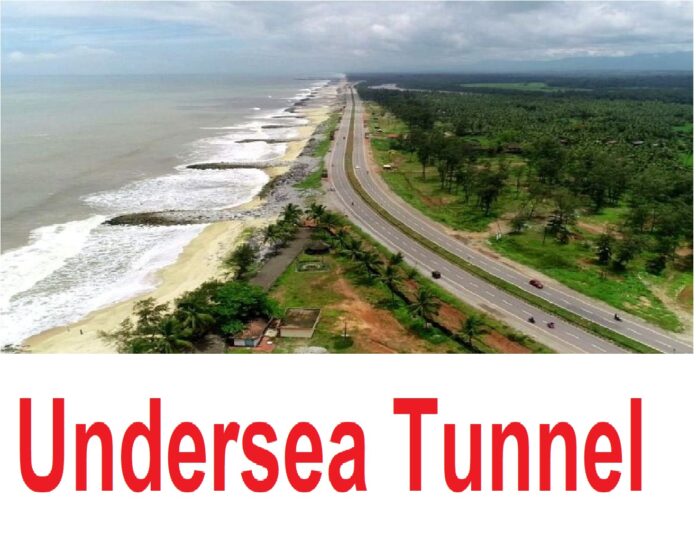Plans are on for the construction of India’s first undersea tunnel, which promises to transform the country’s transportation landscape. This tunnel, designed to bridge a deep shipping canal, is expected to play a critical part in the ambitious coastal highway project, seamlessly integrating districts and altering the way products and people travel across Kerala’s enormous breadth.
A Connectivity and Efficiency Vision
When finished, this undersea tunnel will be India’s first tunnel beneath a deep shipping channel, providing a critical link for seamless transit along the proposed coastal route.
The Kerala government’s visionary effort comprises the construction of a coastal highway that will reach from Thiruvananthapuram to Kasargod, covering around 623 kilometers. Thiruvananthapuram, Kollam, Alappuzha, Ernakulam, Thrissur, Malappuram, Kozhikode, and Kannur are among the nine coastal districts that will be served by this massive project. The anticipated budget for this enormous project is Rs 6,500 crore, underlining the magnitude and significance of this transformative initiative.
A Joint Development Effort
Collaboration between the Kerala Road Fund Board’s project management unit (KRFB-PMU) and the National Highways Authority of India (NHAI), which operates as part of the Bharat Mala Pariyojana Scheme, is a critical component of this comprehensive project. As a result of this collaborative effort, the coastal highway emerges as a model of efficiency and functionality, combining the expertise of local entities with the substantial resources and experience of a national body.
Navigating Difficulties: The Kochi Conundrum
The projected highway faces a unique obstacle as it approaches the thriving city of Kochi: crossing the deep shipping channel of Kochi Port. This area is defined by Fort Kochi on one side, which represents urban prosperity, and Vypeen Island on the other. Bridging this gap while maximizing transportation efficiency is a daunting task.
A Subterranean Approach
Jose Paul, a respected former acting chairman of the Jawaharlal Nehru Port Trust, devised a brilliant idea. Paul proposed building a two-kilometer-long undersea tunnel between Vypeen and Fort Kochi. This suggestion first appeared in 2015, following the horrific Fort Kochi boat accident that claimed the lives of 11 people. The tunnel, which is envisioned to be around 35 meters below the seabed, would begin approximately 800 meters from either shore.
Engineering and Feasibility Marvel
The possibility of this undersea marvel got significant traction, thanks to a detailed report in The Hindu. Despite the shipping channel’s limited width of 260 meters, the tunnel’s design emphasizes big trucks and container trailers, necessitating a comfortable gradient. The approach road leading to the tunnel requires approximately 800 meters on either side to accommodate this. As a result, the overall length of the tunnel is expected to be around 2.6 kilometers.
Efficiency in Design
Modern tunnel design prioritizes functional separation, accommodating automobiles, bikes, and pedestrians. This division ensures that traffic flows smoothly, which is essential in any contemporary infrastructure. With access locations at Puthuvypeen and Fort Kochi Beach, the proposed tunnel has the ability to not only alter transportation but also reduce land acquisition requirements, which is a hallmark of efficient urban design.
Potential for Financial Sustainability and Tourism
The estimated cost of the undersea tunnel is roughly Rs 1,500 crore, according to discussions with tunnel building specialists. This investment, on the other hand, has the potential to reduce traffic congestion, provide an efficient alternative to the national transportation network, and facilitate the smooth flow of people and products throughout Kerala. Furthermore, the tunnel’s potential as a tourist attraction opens up opportunities for rapid money creation through toll charges.
A National Asset with Transformative Potential
Once completed, the undersea tunnel will be India’s first tunnel beneath a deep shipping canal. Aside from its immediate transit benefits, this tunnel has the potential to be a revolutionary asset for the country. It will serve both urban and rural communities by lowering travel time, conserving energy, and streamlining transportation. The tunnel represents a forward-thinking societal investment in the nation’s infrastructure, with an estimated lifespan of more than 100 years.
The Path Forward
Given its passage via the Cochin Port Authority’s domain, the undersea tunnel project is financially responsible to the Central government because it connects to the extensive coastal roadway network. This comprehensive approach emphasizes the tunnel’s potential as a unifying factor, integrating disparate regions and populations under a single infrastructure canopy.


